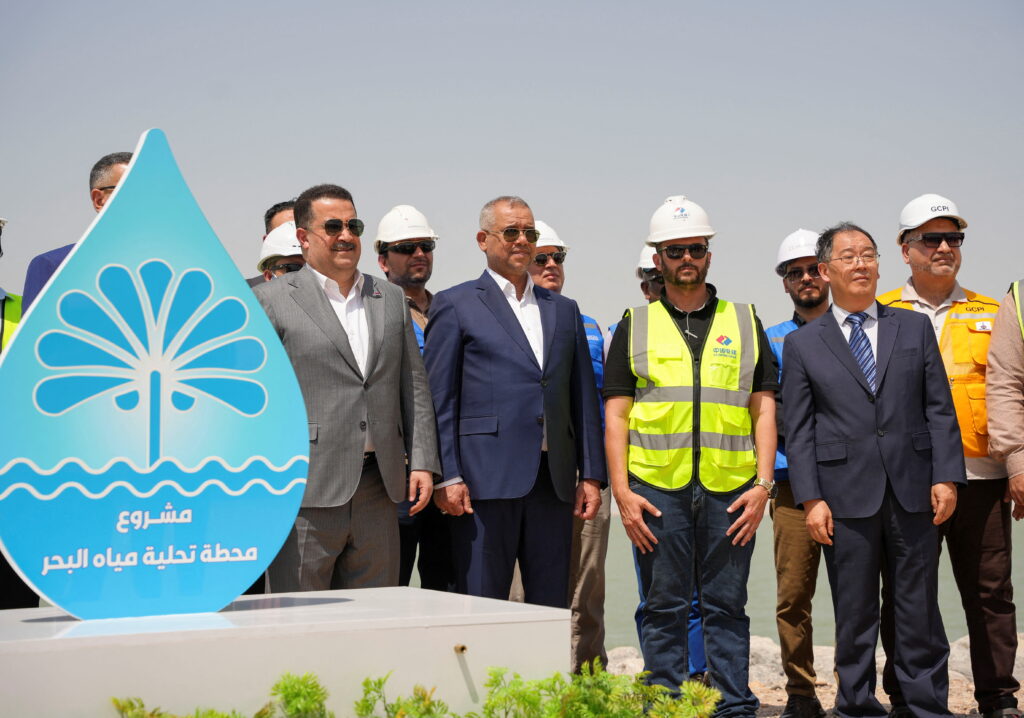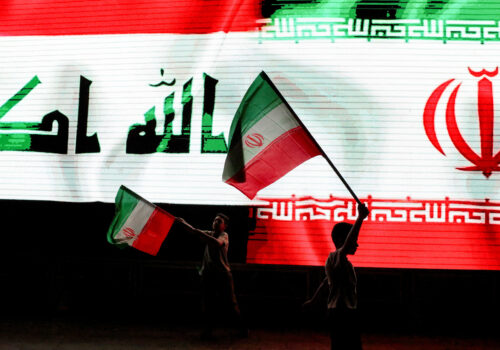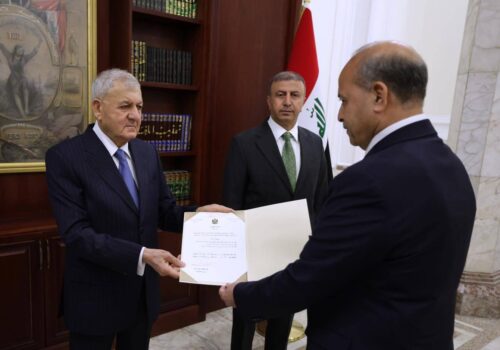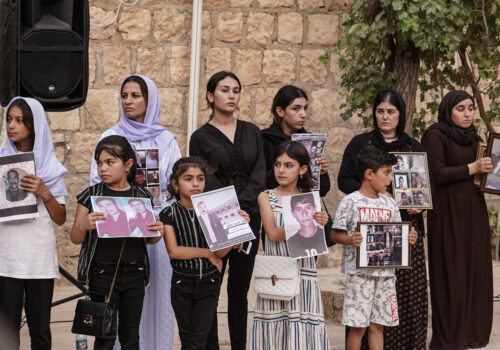Dispatch from Basra: Glimpses of hope in Iraq’s forgotten south
BASRA, Iraq—There is perhaps nowhere else where the high hopes of the new Iraq were so dashed as in its second city, Basra.
In 2003, the United States and United Kingdom aspired towards a renaissance for Basra that would restore it as a major economic hub of the region—a gateway to Iraq, and an equal to the other great trading cities of the Gulf. Instead, its strategic location close to Iraq’s oil resources and maritime outlets to the Gulf and the Iranian border is exactly what condemned the city as the main source of wealth extraction for Iraq’s new Shia political elite, a murky morass of corruption and gangsterism, and a vital part of Iran’s network of foreign allies and proxies.
In July, I made a return visit to the city as a private sector consultant (my last visit was on my farewell tour as British Ambassador in 2019).
Happily, there were positive signs of stabilization and reconstruction. Old friends reported security had improved, and the center of the city was visibly better: new roads, commercial and residential developments, an excellent five-star hotel, and good restaurants. Downtown overall looked cleaner and busier, with people going about their business freely and easily. Arriving at the airport, immigration and customs procedures were welcoming and orderly, if a little overwhelmed by the numbers arriving. Rows of Chinese workers were sitting waiting for their clearances, a sign of the times as China is now a major and growing player in the hydrocarbon and infrastructure sectors in Iraq.
Basra is sharing in a wider positive picture in Iraq of improved security and visible reconstruction, although the picture remains heavily tainted by corruption and dysfunctional governance as powerful political parties and militias opaquely siphon off revenues, hydrocarbon resources, and kickbacks on contracts.
The source of these big negatives is a complex interplay of elite bargains at local, national, and international levels.
All the big Shia political parties and militias have a presence and share control over rent-seeking in the hydrocarbon sector, the ports, borders and customs, public sector jobs, and the smuggling of arms, oil, and drugs. Local armed tribes also assert their claims to some of these sources of revenue. Additionally, Iran sees Basra as strategically vital for its security and prosperity. Tehran wields influence commensurate with its interests here. It will always be the big, closely-connected neighbor. But its power should not be overstated.
Basra’s governor, Asaad al-Eidani, has been in the post for eight years. It is not an easy job to deliver any progress in Basra against such a difficult political and economic environment. Still, only his bitterest opponents would deny him any credit for doing so. The population of Basra remains dissatisfied with the state of the city and the province, given the amount of wealth that is generated locally, of which they see only little. They regularly protest, particularly in the summer, about shortages of water, electricity, and jobs, as well as weak health and education services.
The chronic crisis of shortage of clean, potable water in Basra is the biggest scandal where political dysfunction and environmental crisis intersect to expose one of the worst failures of governance in post-2003 Iraq. As usual, it is the poorer and marginalized who suffer most.
Basra has traditionally relied on freshwater delivered by the main rivers of Iraq, the Tigris and Euphrates, whose confluence is forty miles north of Basra, and tributaries from Iran.
Upriver dams in Turkey and Iran have markedly reduced those flows, and salinization of the water around Basra from the Gulf along the Shatt al-Arab has increased. Old infrastructure is collapsing, and major new water purification projects have been proposed many times in recent decades, but have fallen foul of political infighting and corruption over who gets a share of the spoils and budget shortfalls when the oil price is low. Iraqi Prime Minister Mohammed Shia’ al-Sudani visited Basra when I was there. General elections are due in November 2025, and the Prime Minister was launching and announcing progress on various big projects in and around Basra—including the latest attempt to do something decisive about the water crisis with the help of a major Chinese contractor, PowerChina. While the people of Basra hope for delivery this time, there is much skepticism about whether a unified political will would overcome the obstacles that have prevented progress for so long.

Another major program that has been debated for over a decade is the capturing of flared gas from the major oilfields near Basra, which is not just wasteful but also damaging to local health and the environment. On this, progress has slowly been made. As I travelled around the oil fields on my July trip, I could see much less flaring than there used to be. The oil ministry and Iraq’s partners among international oil companies are promising more progress in the coming years.
During his own visit to Basra at the end of July, al-Sudani associated himself with projects on new roads, bridges, gas, electricity, water, and solar power. This is not all pre-election talk. Al-Sudani is a competent technocrat and engineer by training. In the last three years since taking office, he has overseen new heights of reconstruction across Iraq, particularly big, new residential and commercial complexes in the capital Baghdad. He is a symbol of what Iraq is starting to achieve.
Iraqi and Basrawi politics have settled into something insufficient for what the public demand and deserve— but at least there is enough security and governance to allow widespread reconstruction. Basra is no longer missing out on this. Growing Iraqi capacity at both the state and governorate level, as well as the pressure of public opinion through elections and protests, should allow further progress in the coming years. Iraq was not involved militarily in the recent regional conflict between Israel and Iran, in part because Tehran did not want to risk its powerful network of allies and proxies in Iraq. Additionally, Iraq’s political elite is pursuing its interests, including growing business empires, in a way that sometimes challenges external influence from neighboring countries, including Iran.
Iraq is far from where its people and its friends would wish it to be in terms of sovereignty, stability, and prosperity. But looking back across the twenty-two years of my personal knowledge and connection with Iraq, I see that time, across the decades, has been a healer. Iraqis are learning to build the internal relations and trust between major political parties and leaders, including across ethno-sectarian lines. This is key to overcoming ethno-sectarianism, weak institutions, and vulnerability to external intervention. We saw this after the last national elections with the attempt to form an ethnically diverse, cross-sectarian coalition. That attempt did not succeed, but such attempts are not going to go away.
The pathway to enduring stability cannot be rushed, and foreign support can only go as far as Iraqis themselves permit.
Overall, the security and prosperity trends are positive: growth in the economy, the non-oil economy backed-up by visible evidence of reconstruction, and what people expressed to me on the ground—even if widespread corruption continues to act as a brake on progress.
Internationally, Iraqis do not want to put all their eggs in one basket. They want strong political and economic relations with all their neighbors, the major powers, and the advanced economies of the world. China has developed a much bigger presence in recent years, but reputable Western businesses are far from frozen out. Iraqi leaders recognize their economic development will require a greater role for the local private sector and international business partners from across the world. Particularly with oil prices at current levels, the government budget is dominated by public sector salaries. The government cannot afford to finance reconstruction without the support of the private sector and implementing partners. Ministers freely admit this.
Despite its many challenges, I left Basra with more hope than I had six years ago that this part of Iraq, and those who do business with it, will enjoy more of their fair share of these positive trends in the years to come.
Ambassador Jon Wilks is a distinguished fellow at the Atlantic Council and leads the Rafik Hariri Center’s Transatlantic Program. He was the UK ambassador to Qatar, Iraq, Oman, and Yemen, as well as its special envoy to Syria. Wilks is also a senior advisor to the Iraq Britain Business Council.
Further reading
Mon, Jun 30, 2025
Balancing acts and breaking points: Iraq’s US-Iran dilemma
MENASource By C. Anthony Pfaff
The future of US–Iraq relations is neither as dim as it may first appear, nor as promising as one might hope.
Mon, Jul 7, 2025
Unpacking Iraq’s Federal Supreme Court chaos
MENASource By
Regardless of the reasons behind initial mass resignations, the ongoing uncertainty surrounding the Supreme Court is serious.
Thu, Jul 24, 2025
An open wound, a fading light: Marking eleven years since the Yezidi genocide
MENASource By
One consequence of the Middle East's shifting landscape has been an erosion of international attention on Yezidi issues.
Image: A farmer carries freshly harvested dates in an orchard along the banks of the Shatt al-Arab, where rising salinity and water shortages are threatening Iraq’s date production, in Basra, Iraq, July 30, 2025. REUTERS/Mohammed Aty TPX IMAGES OF THE DAY


